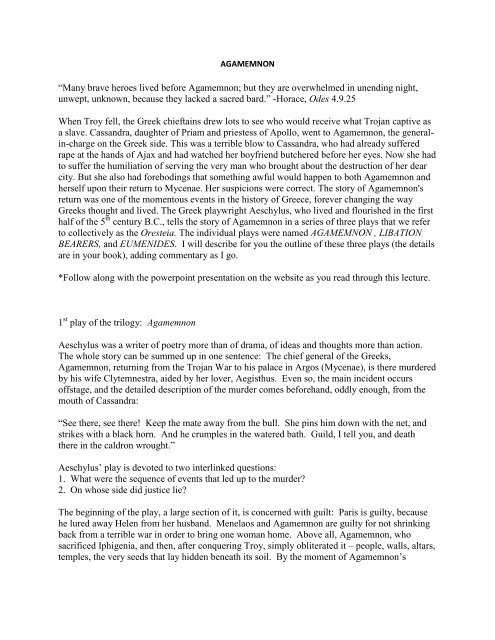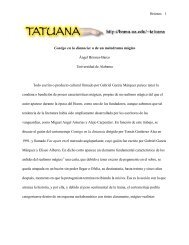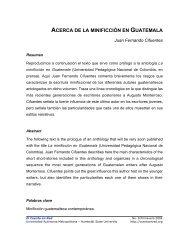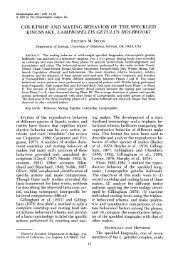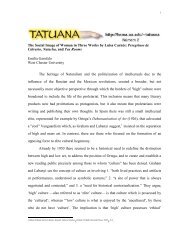“Many brave heroes lived before Agamemnon; but they are ...
“Many brave heroes lived before Agamemnon; but they are ...
“Many brave heroes lived before Agamemnon; but they are ...
You also want an ePaper? Increase the reach of your titles
YUMPU automatically turns print PDFs into web optimized ePapers that Google loves.
AGAMEMNON<br />
<strong>“Many</strong> <strong>brave</strong> <strong>heroes</strong> <strong>lived</strong> <strong>before</strong> <strong>Agamemnon</strong>; <strong>but</strong> <strong>they</strong> <strong>are</strong> overwhelmed in unending night,<br />
unwept, unknown, because <strong>they</strong> lacked a sacred bard.” -Horace, Odes 4.9.25<br />
When Troy fell, the Greek chieftains drew lots to see who would receive what Trojan captive as<br />
a slave. Cassandra, daughter of Priam and priestess of Apollo, went to <strong>Agamemnon</strong>, the generalin-charge<br />
on the Greek side. This was a terrible blow to Cassandra, who had already suffered<br />
rape at the hands of Ajax and had watched her boyfriend <strong>but</strong>chered <strong>before</strong> her eyes. Now she had<br />
to suffer the humiliation of serving the very man who brought about the destruction of her dear<br />
city. But she also had forebodings that something awful would happen to both <strong>Agamemnon</strong> and<br />
herself upon their return to Mycenae. Her suspicions were correct. The story of <strong>Agamemnon</strong>'s<br />
return was one of the momentous events in the history of Greece, forever changing the way<br />
Greeks thought and <strong>lived</strong>. The Greek playwright Aeschylus, who <strong>lived</strong> and flourished in the first<br />
half of the 5 th century B.C., tells the story of <strong>Agamemnon</strong> in a series of three plays that we refer<br />
to collectively as the Oresteia. The individual plays were named AGAMEMNON , LIBATION<br />
BEARERS, and EUMENIDES. I will describe for you the outline of these three plays (the details<br />
<strong>are</strong> in your book), adding commentary as I go.<br />
*Follow along with the powerpoint presentation on the website as you read through this lecture.<br />
1 st play of the trilogy: <strong>Agamemnon</strong><br />
Aeschylus was a writer of poetry more than of drama, of ideas and thoughts more than action.<br />
The whole story can be summed up in one sentence: The chief general of the Greeks,<br />
<strong>Agamemnon</strong>, returning from the Trojan War to his palace in Argos (Mycenae), is there murdered<br />
by his wife Clytemnestra, aided by her lover, Aegisthus. Even so, the main incident occurs<br />
offstage, and the detailed description of the murder comes <strong>before</strong>hand, oddly enough, from the<br />
mouth of Cassandra:<br />
“See there, see there! Keep the mate away from the bull. She pins him down with the net, and<br />
strikes with a black horn. And he crumples in the watered bath. Guild, I tell you, and death<br />
there in the caldron wrought.”<br />
Aeschylus’ play is devoted to two interlinked questions:<br />
1. What were the sequence of events that led up to the murder?<br />
2. On whose side did justice lie?<br />
The beginning of the play, a large section of it, is concerned with guilt: Paris is guilty, because<br />
he lured away Helen from her husband. Menelaos and <strong>Agamemnon</strong> <strong>are</strong> guilty for not shrinking<br />
back from a terrible war in order to bring one woman home. Above all, <strong>Agamemnon</strong>, who<br />
sacrificed Iphigenia, and then, after conquering Troy, simply obliterated it – people, walls, altars,<br />
temples, the very seeds that lay hidden beneath its soil. By the moment of <strong>Agamemnon</strong>’s
triumphal entrance into the play, he appears about as guilty as a man could be – guilty as<br />
commander, guilty as father, guilty as husband.<br />
There <strong>are</strong> other factors going on in the background to add to the moral texture of the play. Helen,<br />
when all has been said and done, is safe at home with her husband Menelaos, suffering no<br />
punishment for running off with Paris or causing the way. Many, many people suffered at Troy,<br />
on both sides, Greek and Trojan. Soldiers suffered in the cold and dampness of winter in their<br />
tents. The summer was blistering hot. Death was everywhere. Food was scarce. In contrast, we<br />
have this description of Helen’s arrival in Troy:<br />
“When she first came to the city of Troy, call it a dream of calm and the wind dying, the<br />
loveliness and luxury of much gold, the melting shafts of the eyes’ glances, the blossom that<br />
breaks the heart with longing. But she turned in mid-step of her course to make bitter the<br />
consummation, whirling on Priam’s people to blight with her touch and nearness. Zeus<br />
hospitable sent her, a vengeance to make brides weep.”<br />
In a few words, Aeschylus has made Helen as lovely and demonic as can be? Why? Because<br />
Helen is an integral part of the moral texture of <strong>Agamemnon</strong>. We have to stand, and look at<br />
Helen too, to understand <strong>Agamemnon</strong>’s murder – why did he kill his own daughter to bring her<br />
back?<br />
The play opens with a watchman on a roof in Mycenae, looking for the relay of signal fires<br />
coming from Troy indicating that the war is over. He is tired, and he is worried. A dark cloud<br />
hangs over the city. Clytemnestra is inside the palace, muttering and brooding, seething with<br />
hatred for <strong>Agamemnon</strong>. She has taken on a lover, <strong>Agamemnon</strong>’s own cousin Aegisthus. The<br />
two of them <strong>are</strong> definitely plotting something disastrous if ever <strong>Agamemnon</strong> returns home.<br />
When the signal fires do come, the story is set in motion.<br />
The details of the story can be found in your book. Suffice it here to say that this is a story of<br />
moral confusion. The participants in this story <strong>are</strong> all basing their actions on an old principle,<br />
represented primarily by the older generations of the gods (the Furies), called lex talionis, that is,<br />
the law of retaliation. It’s an eye for an eye, a tooth for a tooth. There’s no need of a trial – just<br />
instant revenge.<br />
What’s interesting here is that everyone believes that what <strong>they</strong> did fulfilled the demands of Dike,<br />
the goddess justice.<br />
For example:<br />
After <strong>Agamemnon</strong> arrives at the port, climbs on his chariot, and heads up to the lion’s gate of<br />
Mycenae, a herald leads the way with these words: “Greet him who has dug Troy into the<br />
ground with the pick-axe of Justice (Dike)-bearing Zeus!”<br />
And when <strong>Agamemnon</strong> arrives at the gate, he says this: “First, it is right that I should pay my<br />
respects to the land of Argos and her presiding gods, my partners in this homecoming as also in<br />
the just penalty I have inflicted on the city of Troy.”
Furthermore, Clytemnestra has been muttering that Dike will lead <strong>Agamemnon</strong> into the home<br />
and take c<strong>are</strong> of his needs. And after that she murders him while crying out that justice has been<br />
done.<br />
Then when Aegisthus arrives and sees the dead body of <strong>Agamemnon</strong>, he shouts, “O day that<br />
brought justice, now I know the gods exist!”<br />
Further adding to the moral confusion of the play: <strong>Agamemnon</strong> has won a great victory, <strong>but</strong> all<br />
for one woman, as we have said, and with great cost. He did a great job, <strong>but</strong> upon entering the<br />
city, he stepped on the tapestry of the gods that was strewn aside his chariot for him. BUT,<br />
Clytemnestra, lest you think she is innocent, is the one who spread that carpet <strong>before</strong> him, even<br />
though it was a sacrilege for anyone to walk on it <strong>but</strong> a god, and she convinced him and seduced<br />
him to step on it. Clytemnestra has also been having an affair with Aegisthus, and she eventually<br />
kills, not just <strong>Agamemnon</strong>, <strong>but</strong> also Cassandra, who is completely innocent. She also mistreats<br />
her son Orestes by sending him into exile (so he won’t interfere with her plans) and by refusing<br />
to allow the other daughter, Electra, to marry (so her husband won’t interfere with her plans).<br />
Wow. So much confusion. Is the old system of justice (Dike), represented by the Furies,<br />
bankrupt? Do the new Olympian gods have some way to straighten all this out, some<br />
modification of the lex talionis?<br />
The first play never resolves the issue, <strong>but</strong> does gives us a hint where the trilogy is going, when<br />
the chorus sings the following hymn to Zeus:<br />
“Zeus, who laid it down that man must in sorrow learn, and through pain to wisdom find his way.<br />
When deep slumber falls, remembered wrongs chafe the bruised heart with fresh pangs, and no<br />
welcome wisdom meets within. From the gods who sit in grandeur, grace comes somehow<br />
violent.”<br />
There is a popular theme/motif in Greek mythology and literature: Wisdom comes through<br />
suffering. The gods who sit at the helm show their kindness through violence. It’s like the Old<br />
Testament God who chastises his people and is so strict in the enforcement of the laws. Then, in<br />
the New Testament, he shows his grace – this grace wouldn’t have made sense, we <strong>are</strong> to<br />
understand, unless we first saw the strict demands and consequences of the law. In the same way,<br />
Zeus and the rest of the Olympian gods will take over from the previous, harsh and strict gods,<br />
and show a kinder, gentler face, at the right time, once <strong>they</strong> have exhibited their full righteous<br />
indignation and violence towards law-breakers.<br />
2 nd play of the trilogy – Libation Be<strong>are</strong>rs (Choephori)<br />
Several years later, Orestes comes home from exile, driven by the Fates, who <strong>are</strong> demanding that<br />
he take revenge on his mother for killing his father. That’s what the Fates do. They make sure<br />
some relative takes revenge for a wrong done to someone. When he arrives at Mycenae, he finds<br />
his sister Electra at <strong>Agamemnon</strong>’s tomb. Clytemnestra sent her there, after a terrifying dream in<br />
which she gave birth to a snake which turned around and then bit her on her breast.
Clytemnestra wants Electra to pour libations over <strong>Agamemnon</strong>’s tomb to appease him, <strong>but</strong><br />
instead, together with Orestes, plots the murder of her mother.<br />
Orestes then enters the palace with his friend Pylades, disguised as travelers come to announce<br />
the death of none other than Orestes. Yes, that’s a test question. Clytemnestra sends a servant to<br />
summon Aegisthus to hear the news. When Aegisthus comes, Orestes meets him privately and<br />
kills him. Clytemnestra hears him screaming, in a riddle, no lease, saying, “The dead <strong>are</strong> killing<br />
the living!”<br />
Clytemnestra calls for her “man-slaying axe.” It’s too late. Orestes approaches her with his<br />
sword, and she pleads for her life, even baring her breasts so Orestes can see the breasts that<br />
suckled him as a baby. Orestes is about to give in, when his friend Pylades reminds him, “You<br />
received an oracle from Apollo, commanding you to do this.” With that, Orestes regretfully<br />
rams the sword into his mother’s chest.<br />
But now the lex talionis, which seems to have no end, kicks in again. Orestes is the murderer<br />
now. The ghost of Clytemnestra sends the Furies to drive Orestes mad so that he will kill<br />
himself (no one is left to take revenge for Clytemnestra). Orestes runs off screaming.<br />
Note: There is one difference at this point from all the other murders that have taken place.<br />
Orestes has killed, <strong>but</strong> he felt guilt, didn’t want to do it, and resisted. He only did it because<br />
Apollo (and the Furies) demanded it.<br />
3 rd play of the trilogy: Eumenides<br />
Orestes flees to the temple of Apollo, <strong>but</strong> the Furies pursue him there, and Clytemnestra comes<br />
in the form of a ghost, goading them on and demanding justice. Apollo tells Orestes to flee to<br />
Athens, to Athena’s temple on the acropolis, and that only she in her wisdom can free him from<br />
their tortures and the tortures of guilt.<br />
The Furies, meanwhile, <strong>are</strong> portrayed as bloody, dog- like women who hound their victims,<br />
tearing at them with fangs, and r<strong>are</strong>ly stopping to rest. They have rotten flesh on their teeth from<br />
previous victims, and wings on their backs to help them move more swiftly.<br />
Now, to make a long story short, Athena sets up the first trial by jury, 12 Athenians, with herself<br />
as the presiding judge. The winner of the trial only needed a majority of votes. The trial will<br />
take place on the Areopagos (Mars Hill) next to the agora.<br />
The Furies argue on their side that <strong>they</strong> <strong>are</strong> the oldest law in the universe and can’t be overturned<br />
no matter what. It’s their right; justice, to their mind, is simple vengeance. If <strong>they</strong> <strong>are</strong>n’t<br />
honored, <strong>they</strong> will destroy Athens.<br />
Orestes argues that, first, Apollo commanded him to kill Clytemnestra, and he was only obeying<br />
the commands of the Olympian god. Furthermore, he argues, since he is being charged with<br />
killing his p<strong>are</strong>nt, he can say that the mother is not a true p<strong>are</strong>nt, only the father. Just as the
farmer (the father) plants a seed in the earth, so the mother is just the receptacle and nurturer of<br />
the seed, <strong>but</strong> the father is the source of it.<br />
The vote of the jury is a tie, <strong>but</strong> Athena casts the deciding vote in favor of Orestes. The Furies<br />
<strong>are</strong> angry still, <strong>but</strong> she appeases them by giving them a new role (signaled by a name change,<br />
from “Furies” to “Eumenides,” or “Kindly-minded Ones”), and a shrine in the city of Athens<br />
where <strong>they</strong> will still be honored.<br />
Thus Athena has taken the old conception of justice as an eye for an eye and replaced it with a<br />
new concept: trial by jury, which takes into account extenuating and mitigating circumstances.<br />
Justice is now tempered by mercy, reasons, and legal debate. Justice is made a beautiful thing,<br />
when once it was harsh and violent.<br />
BUT (and this is the key to the myth): the Furies, representing simple vengeance, do not go<br />
away. They’re still in the city – with a kinder face, now – <strong>but</strong> still demanding the most simple<br />
concept of justice stay intact. Hold all the legal trials you want, <strong>but</strong> you can’t let the guilty get<br />
off scot free, and you can’t ignore the old principles of justice. They still stand behind the new<br />
tempered justice. Hold rational mercy and cold-hearted justice in balance is the message of this<br />
myth as presented by Aeschylus.


